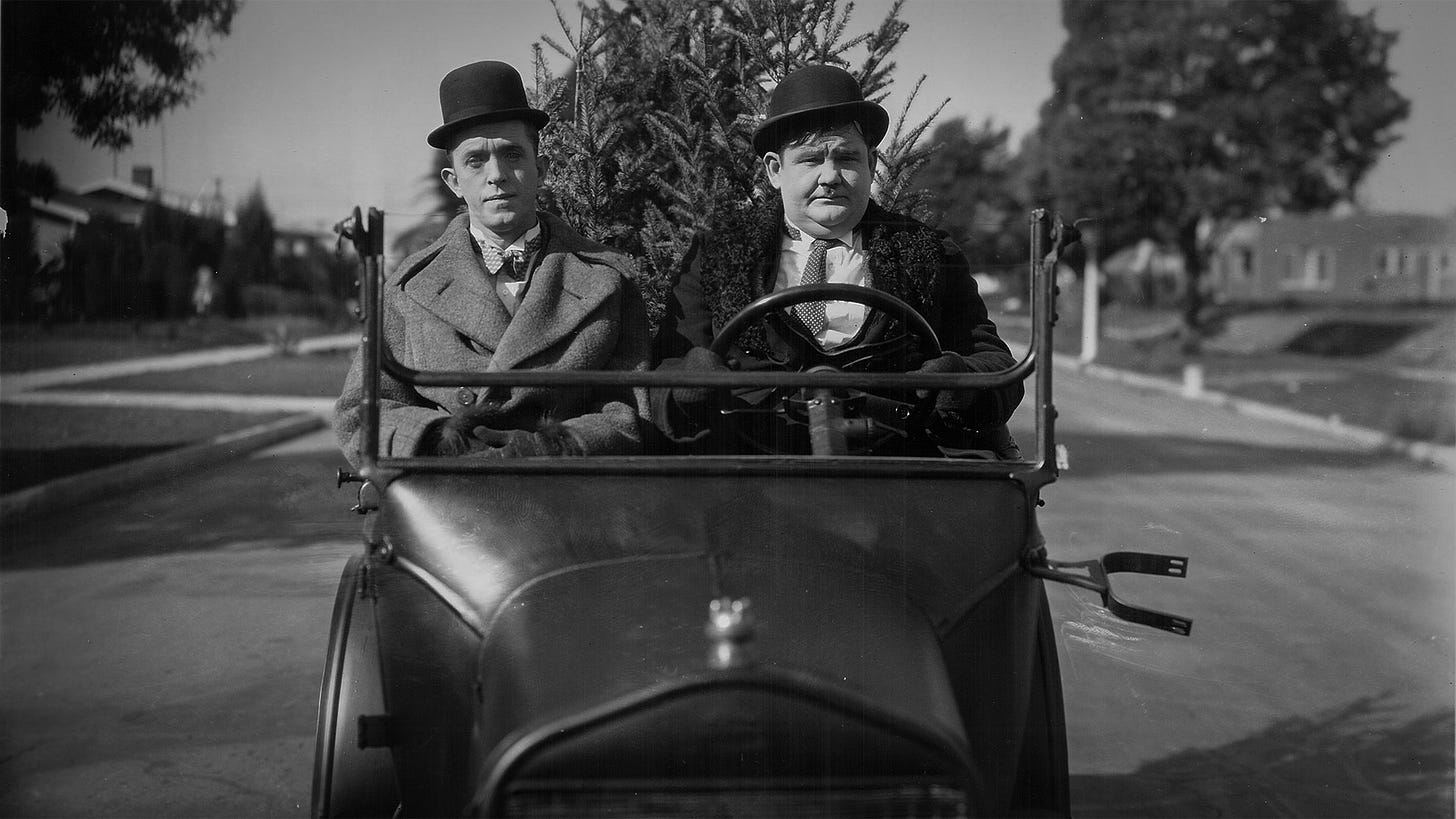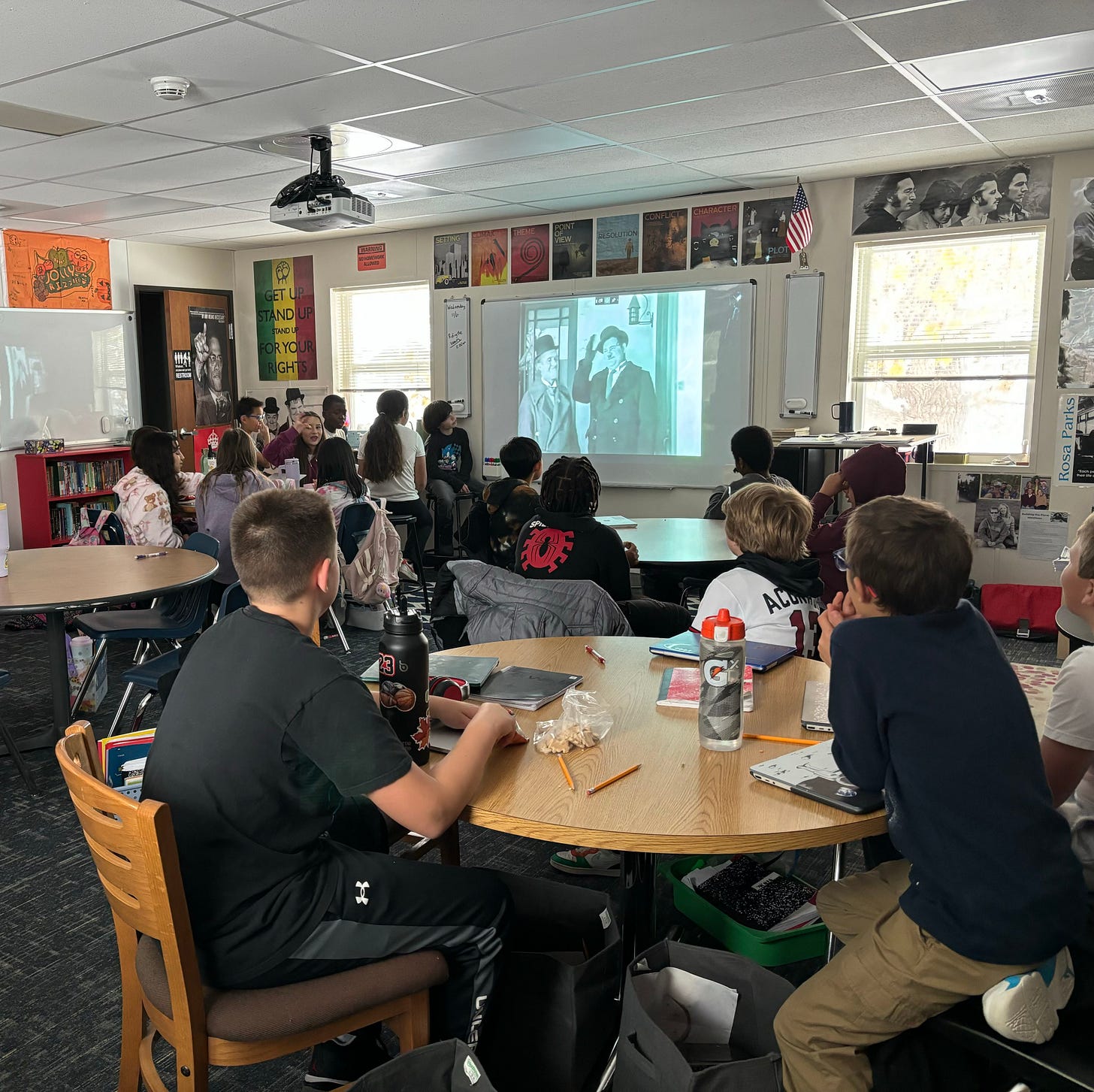Levity
A shortcut to our shared humanity.
Last week was tough. I had parent-teacher conferences. I had 100% parent attendance. I have 27 students, so that means I had 27, twenty-minute meetings. Every day after school, I met with parents until about 6:00 PM, save one evening, where I was conferencing until 8:00 PM.1 I feel incredibly lucky to have such supportive parents. When I present my pedagogical practice in August, I’m asking parents to trust that Though this be madness, there is method in’t.2 I was happy to hear that my students’ parents support how I run my classroom, and that they trust me with the responsibility of educating their children. It is a responsibility I take seriously.
I felt anxious the weekend following conferences. I knew why. Tuesday, November 5 was going to be an anxious day. Teachers are practiced in compartmentalizing our emotions so that we can continue teaching. I, like many, was nervous for the outcome, and felt trepidation about how my students would react. In 2016, fifth-graders were more talkative about their parents’ politics.3 Election years often felt like extended Super Bowl Sundays, students claiming a team and proudly sharing who they think should win. During those weeks leading up to Election Day eight years ago, I heard a lot of Clinton versus Trump debates in classroom and out on the playground.
But that was the before-times. We have since, collectively experienced a lot of societal trauma, from a pandemic to mass protests to Russia's invasion of Ukraine. Whereas previous election cycles felt exciting, these last couple have been quite upsetting.
I made an effort not to watch any election coverage. I was still exhausted from conferences. I wanted to be present with my family and go to bed early Tuesday night.
Wednesday morning, we woke up to our first Colorado snowstorm of the season. I scrambled to shovel the 8.5 inches of snow before my treacherous drive to school. We were all late that day. Three teachers in our building got into car accidents on their way to school. Half of my students were absent (some because of the snow, and others because of the election results). I spent most of Wednesday trying to assuage my feelings while making space for my students to voice their own. Surprisingly, only a few students wanted to talk about the election. Still, I struggled to teach. My heart is always with my students, but that day, my heart felt heavy and my head was elsewhere.
More snow Thursday. No delays. No cancelled school. I could feel teachers’ collective irritation and exhaustion as we attempted to teach our best despite indoor recess.
During stressful times, which I’ve had many in my 22 years, I have learned that leaning into the humanity of my students (and myself) is the best salve. The truth is, no matter what happens in the world, every day, students show up in our classrooms. They arrive with their own burdens, but also with hope that their classroom will be a safe space for them. Whether or not they want to discuss anything, classrooms should be places where students find solace with their friends and peers. My job, is to provide a space where we can all feel more human and connected to each other’s humanness.
So, what did I teach this week? Not much. I was a bit surprised that I did teach some academic content. We learned about decimal place value and expanded notation; read, annotated, and discussed an excellent short story by Kate Messner; and worked on our sensory memory narratives from John Warner’s book The Writer’s Practice. However, instead of pushing through to the next lesson in the curriculum map, I chose levity.
Whenever I think about my grandfather, I think of Laurel and Hardy. I have vivid memories of sitting on the floor of my grandfather’s house, in front of the television, watching Laurel and Hardy shorts. My grandfather sat behind me in his chair, laughing harder than anyone I had ever seen laugh. One of his favorites was The Music Box (1932). He was obsessed with Stan and Ollie. His home was filled with Stan and Ollie trinkets and vintage memorabilia. One afternoon, he took me to see the Music Box staircase on Silver Lake Boulevard where they filmed The Music Box. We walked up and down those stairs, imagining how difficult it would be to carry a piano.
For years, whenever I visited my grandfather, we would watch Laurel and Hardy. When he passed away, I inherited his VHS collection.4 I’ve since shared my love of Laurel and Hardy with my own children, creating wonderful memories of watching and laughing together as a family. Whenever anyone feels down, we turn on a talkie.
At the beginning of the year, when I’m getting to know my students and building relationships with them, I tell stories about myself through media. I tell them about my grandfather’s love of Stan and Ollie, and how much I love watching their shorts.
These days, whenever I feel like things are too heavy, and we need some levity, I pull out a few of Laurel and Hardy’s short films to watch with my students. No teaching. No academic content. Just sitting and laughing together. Fifth-graders love slapstick comedy and are fascinated with black and white movies, especially silent films.
So, while it was snowing outside and I was still internally reeling from Election Day, I cued up some of my favorites. We watched Big Business, and of course, The Music Box. I didn’t worry about whether students would fall behind in our curriculum. Since we didn’t get a snow day, we stayed inside and laughed. Laughter connects people faster than anything else. People who laugh together are bonded in a shared humanity, and that’s what I needed to feel this week. I chose to experience levity with my students.
In these stressful times. I hope you find time to experience joy and levity.
Have a great week!
— Adrian
Resources
Laughter and Learning | David Penberg
In case you are looking for some research or scientific evidence to support the necessity of laughter in school. Education Reimagined is a great resource for centering students. Penberg, currently working with 2Revolutions, does a nice job summarizing research of laughter in increasing student learning.
This is such a great conversation between Tim Cavey and Jake Miller! Check out the 26:50 mark to hear why Jake values fun and laugher in education.
Silent Movies | The Teacher James
As a teacher, I’ve experimented with using Laurel and Hardy’s silent shorts to help my students write dialogue. It’s fun and challenging, and leads to some hilarious writing. Teacher, James Taylor, has some great examples he uses with his students. I think I will try some of these out in my classroom!
I totally geeked out watching this fascinating video about the history of early sound films. As an added bonus, it includes clips from some of my favorite movies!
Playlist of my Life Slide Deck
Here is the slidedeck I use for getting to know my students. I have students use their slide decks to create their first narrative writing pieces. I’ve improved it throughout the years with help from Greg Michie and his playlist project.
Recently, I had the pleasure of being on the Teachers on Fire Substack podcast with Tim Cavey. At the 3:58 mark, I discuss the Playlist of my Life project above.
Other posts you may like.
Please do not read these as complaints. This is the nature of being a public school teacher.
I say parents’ politics because in my experience, ten-year-olds often parrot their parents’ views. Fifth-graders are very opinionated, by nature. However, I have observed that rarely have they spent time thinking about their opinions and how they may or may not differ from their parents’ views.
Unfortunately, I’m missing a few volumes. I wish I had the entire set like this guy!







I'm so thankful for you. Beyond the content, I wonder how you have time to be so productive. That you take precious time to share with (read: bless) strangers is beautiful. Thank you for your humility, generosity and creativity.
This year I'm having to create curriculum on the fly each week. You're providing ideas that inspire me and therefore my students. We all Thank you!
Wonderful, wonderful post. Remembering that in the classroom we are, above anything else, a gathering of humans. My Wednesday evening college class was much like you describe your Wednesday Fifth Grade class--low attendance, in part due to the election. Emotionally subdued. Very few wanting to talk about it. Because it's college, I was able to let them leave early. We had to keep working on essays, but the low attendance allowed me to sit with each student individually, and I was able to check in on some who were visibly upset. I chose to cherish that, and hold the missing students in my heart, with great understanding. Now you've challenged me to think about levity. My class isn't a laughing type of class; most come in tired from working all day. But I'm wondering if we might, tonight, somehow, laugh together.